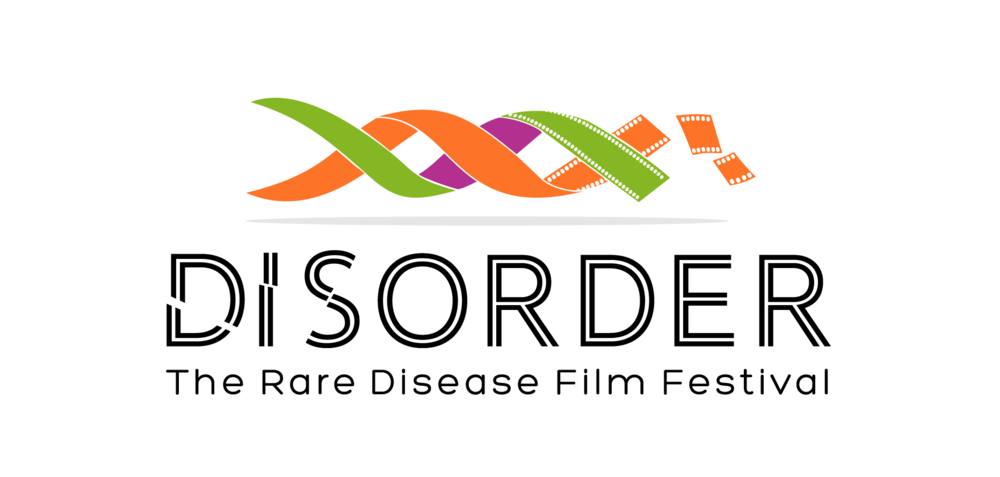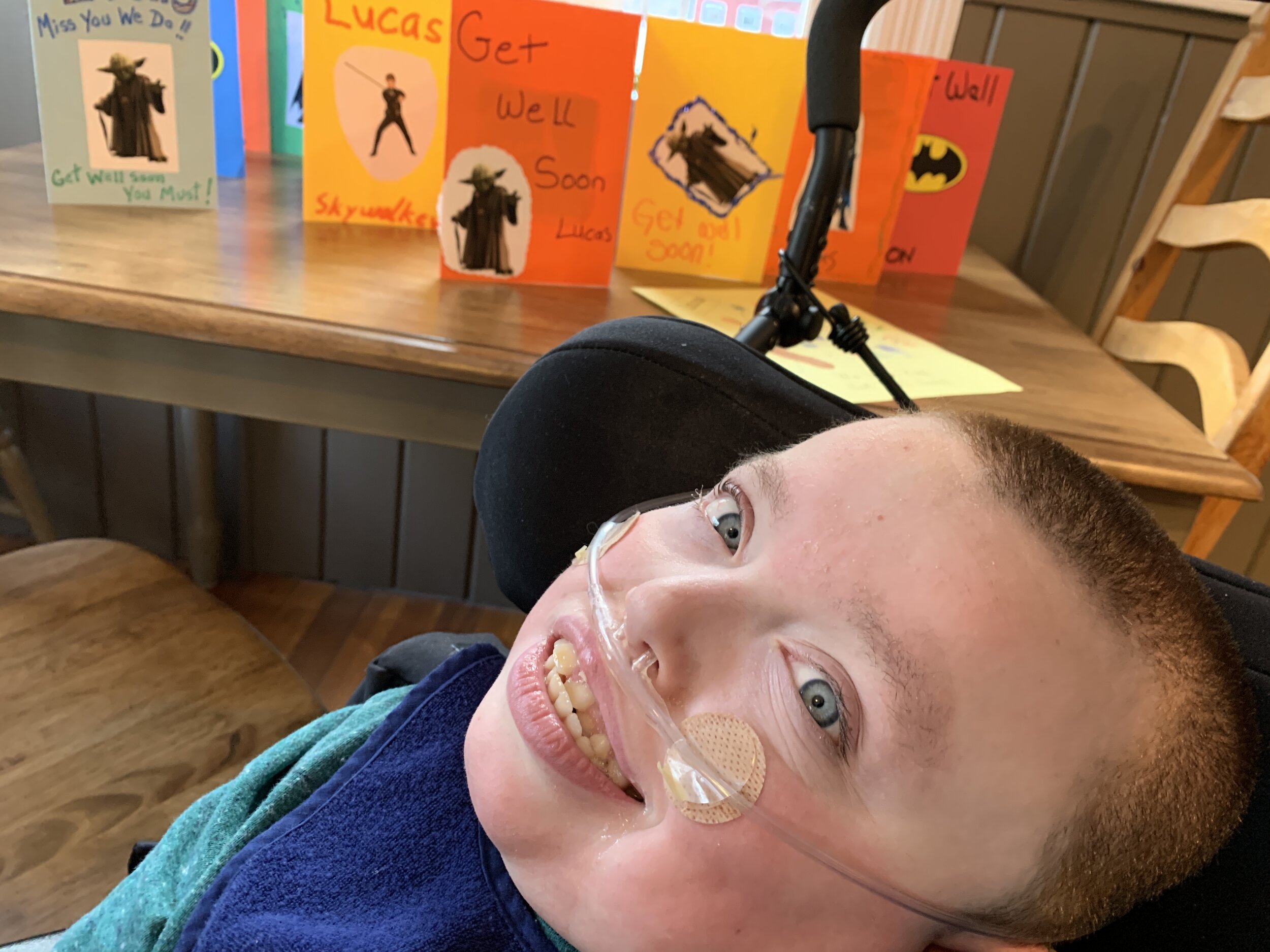The run up to our film festival is a lot of work. I tend to let some other aspects of my life slip a bit thinking I’ll give them the attention they need once the festival is over and things calm down. This year that calm did not last long. From just after Thanksgiving to just before New Year’s has been a bit rough for my boy. For all of us.
This is about breathing, and taking a breath. Mostly as concerns my son, but also for his mom and me. Due to complications from Menkes Disease my son was recently put on oxygen. It shouldn't be such a big deal in our lives. Lots of people are on oxygen. You see those old guys lugging their green tanks and clear tubes around. They all manage. How can something almost lighter than air weigh down on us so heavily?
Perhaps it's mostly symbolic. Is the oxygen a harbinger of the next decline, the beginning of the end? Until this month we had been so pleased that our 11 eleven year old boy had been stable, well, stable for him. We had no unplanned hospital visit for the past 4 years. This month we had 4 of them in as many weeks.
We never kidded ourselves that a degenerative disease could be held at bay for very long. And yet to see and hear a sign of what feels like steep decline shakes us. It has forced some more of those big conversations about the end, how it will come, when it will come, how much we'll fight against it.
We've always said (in the abstract) “no extreme measures”. We want quality of life not quantity of years. The last big change to his level of care was a g-tube for feeding and nothing by mouth. Luke has lived a much happier, healthier life for the last 9 years because of that. Was it an extreme measure? Is oxygen?
In the hospital I kept thinking of a line my friend Matt Sames says in a film we screen at our festival. He said “you think of degenerative disease as a constant slope down, it isn't. It's a plateau and then a sudden drop and then another plateau and then another drop”. I clung to those words. Maybe, as we have before, we'd weather this current steep plunge and Lucas would come out on the other side and settle into the plateau of his new normal. We'd get used to his new level of care. We and he would enjoy life for the next stretch never sure how long that plateau will last.
It's been a rough month. From the day after Thanksgiving to the day before Luke's 11th birthday we spent 11 days in the hospital and one night at a sleep study clinic. In our house the day after Thanksgiving is not Black Friday, it's called Festive Friday. We don't go shop. We decorate the house for Christmas and bake cookies. This year the tree was left half trimmed, the cookie dough left in the fridge as we headed to the ER. Festive Friday became restive Friday. The acute issue turned out to be a blocked and distended kidney. They got that drained and eventually got many stones out. But along the way someone says “Lucas should be on oxygen.” Someone with a Doctor before his name.
And here's where I sound heartless. I'm not. I'm frustrated. But we know almost every system for Luke is compromised. So it feels like whatever specialist gets to look at him will be the next one to add to a list of his symptoms which need treatment. If the heart guy checks him out we'll discover heart problems. If the foot doctor comes in, we can hear a long list of what's wrong with his feet and what can (must?) be done about that. Let me be flippant here, it's my blog, I'm venting. I feel like the surgery ended with “The procedure was a complete success, but we discovered your son is dying.” Yeah you, doctor of the day, you discovered he's dying today. We, his parents have been facing this for 10 years.
And we're caught is this spot of when is a treatment more harm than help. We can not fix everything that's wrong with Luke. Should we try to be fixing everything that can be fixed? We are parents forced to triage their child. Dislocated elbows? Ignore those. Doesn't matter to Luke or to us. Ditto dislocated hips. Curved spine, that was a tough call probably our most difficult to date. Inability to eat, that's pretty essential, so we got that solved a while back. And now breathing. What could be more critical both in reality and symbolically that drawing breath? And as it turns out expelling breath.
Here's a new piece of my armchair medical school training: it never occurred to me that you might have two different breathing issues. We need to get the oxygen in and get the carbon dioxide out --of course, grade school science there. But I didn't realize the two are not always reciprocal. You can add oxygen by mask and tube and only be solving half of the problem. Lucas' twisted posture and low muscle tone are making it harder for his lungs to inhale but also to exhale enough CO2. The fix there isn't as simple.
So he goes home on oxygen. And we know we're not solving the other half of the problem. But good news his school and the nurse in his classroom are all set to handle his oxygen needs. We're headed closer to his normal routine again. And then this small bit of logistics: the school bus has no nurse on board. It's not impossible to get one but it could take months if it can happen at all. So Luke can't ride the bus. His school isn't far. I could drive him everyday. It's a hassle but not horrible. Just another change for our new plateau I guess.
Then we catch our first break. The oxygen order is re-written in a way that says “okay to ride school bus without oxygen”. That was something so small but huge too. And we didn't just catch that break we made that break happen.
Here's where I talk about palliative care a bit. It deserves it's own multi-page essay. It's so helpful and also so misunderstood. Many people, if they think of palliative care at all, think of it along the lines of “let's make things easier and comfortable while you die”. I thought of it like that. Even though my friends include a palliative care nurse, and the head of a group that advocates for understanding and embracing the benefits of palliative care. But if my one-liner understanding is the least bit accurate, it is the first half that should be emphasized and not the last. We discovered this month that “let's make things easier” is a much more important function than the “while you die” part. Five years ago when we decided not to do spinal corrective surgery for Lucas, it was a talk with a palliative care doctor that helped us feel confident in that. This month it was another palliative care doctor we called to get our bus riding exception. Palliative care teams will talk a lot about quality of life. I think when you're not in a place to hear what they are saying “quality of life” sounds like a euphemism for “Sometimes we should let our loved ones die”. But when you're in it, you realize there are a number of steps along that path. Steps where having someone to advocate and make things easier is a blessing. Especially someone with Doctor before her name.
Another piece of my amateur medical training this month came from our new palliative care doctor. We should never have CPR done on Lucas. Of course. But we had never thought it through. Luke is fragile in general and brittle bones are a symptom of Menkes Disease. CPR on him might restore him to life but with shattered ribs causing how many new problems? Problems that might be fatal, more slowly and painfully fatal. So it was relatively easy for us to sign a DNR (do not resuscitate) order to exclude CPR treatments.
That was another piece of our recent education. We thought a DNR was more over-arching and all inclusive. Something like: don't do anything to resuscitate. But the form clearly offers this laundry list of measures you opt to prohibit or allow one by one. And it can be empowering for patients and parents. The medical system is built so that they will do everything than can to “fix” you. For most of us this is just as it should be. My wife and I have begun to say “ fixers gonna fix”.
We left the hospital with a new “fix”. They discovered Luke was anemic. So just start him on some liquid ferrous sulfate. Seems reasonable. Except it creates so much stomach distress the poor kid is suffering for a week. He can't eat. Aaaaaand we decide that particular fix is a treatment worse than the problem it's meant to remedy. We stopped the iron, he began to recover.
The latest thing they want to fix is this whole inhale exhale problem. The first sleep study on December 12th tells us he'll need to be on a bi-pap mask while he sleeps. But the good news is he won't need oxygen while awake after all. Another sleep study is needed to figure out the best settings for his new mask. That study happened December 27th. I feel like there's an old joke, maybe Rodney Dangerfield: “I took a sleep exam... and I flunked”. Well Luke flunked. A few hours in it was clear he couldn't tolerate the mask. So now we wait and see if there's another option or if this time the tough choice of not pursuing a treatment has been made for us.
Oxygen is almost as light as air, literally, but it's emotional weight for us is much heavier.
PS. During this saga I found serendipitous comfort at 4am when I could not sleep in the hospital from the fantastic podcast “Once upon a Gene” by Effie Parks. The episode happened to be “How to survive your hospital stays.” And her son Ford’s laughter is the best medicine.
And this week when I couldn’t sleep after the failed sleep study I stumbled upon an episode of “Hidden Brain” called “The Ventilator” which while it did not provide comfort did offer useful context and Warren Zevon singing “Keep me in Your Heart”.


